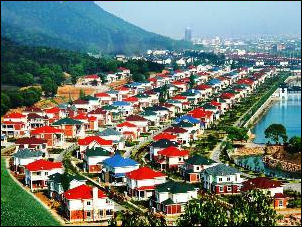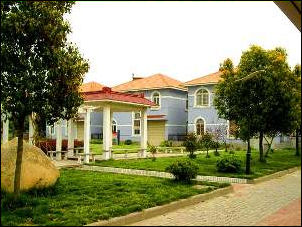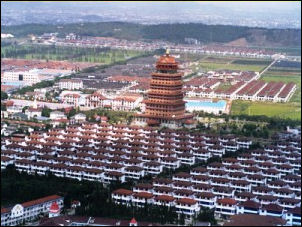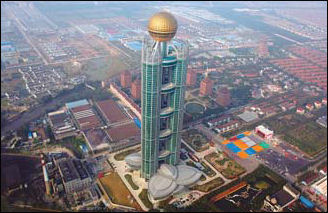HUAXI, CHINA'S RICHEST VILLAGE

Huaxi Village in Jiangyin County in Jiangsu Province is regarded as China’s richest village. Along its Tree-lined boulevards are identical red-roofed villas with manicured lawns and two car garages. As of 2009, each family had a house and at least one car, provided by the community, and assets of $150,000.
Huaxi is home to 30,000 people and remains essentially a commune, with land owned jointly and wealth divided among everyone. Every hour loudspeakers in the village square blast: “If you want to see a miracle, come to Huaxi.”
Gambling and drugs and talking to outsiders are strictly forbidden. There are no bars, karaokes, Internet cafes or nightlife. Anyone who engages in speculation has their property confiscated. For social activities there are lots of meetings and entertainment provided by the village theatrical troupe. Workers receive half their income in regular salaries and half in bonuses. People who move from the village forfeit their property.
RECOMMENDED BOOKS: “Driving toward Modernity: Cars and the Lives of the Middle Class in Contemporary China by Jun Zhang Amazon.com; “China's Housing Middle Class: Changing Urban Life in Gated Communities” by Beibei Tang Amazon.com; “Middle Class Shanghai: Reshaping U.S.-China Engagement” by Cheng Li Amazon.com; “China’s Middle Class: The New Social Stratum”by Li Youmei Amazon.com; “Why China Leads the World: Talent at the Top, Data in the Middle, Democracy at the Bottom” by Godfree Roberts Amazon.com “Being Middle Class in China: Identity, Attitudes and Behaviour” by Ying Miao Amazon.com “China's Emerging Middle Class: Beyond Economic Transformation” by Cheng Li (2010) Amazon.com; “Pianos and Politics in China: Middle-Class Ambitions and the Struggle over Western Music” by Richard Curt Kraus (1989) Amazon.com
Huaxi Success and Wu Renbao
The village’s steel, iron and textiles enterprises brought it $7.3 billion in sales in 2008. The Huaxi Group was the first commune corporation to be listed on a Chinese stock market. The underpinning of the community — the 30,000 migrant workers, who keep the factories humming — receive a much smaller share of the wealth than the commune’s residents.
In 2003, Huaxai contained 58 village-owned businesses that did $1.2 billion in business and had fixed assets of $362 million. Villagers earn an average of $6,000 a year, a lot by Chinese standards, and live in houses that average 400 square meters.
Michael Wines wrote in the New York Times, Huaxi’s splendor and the Beijing government’s wisdom and foresight is extolled “in a lengthy lecture given each morning in an auditorium packed with hundreds of tourists. To hammer the message home, there follows a musical, a sort of Chinese opera with Disney characteristics and toe-tapping lyrics like “Where we live: garden, house, little Western-style mansion What we eat: a food culture full of nutrition What we wear: big brand names of fashion? and “Huaxi is rich in substance, politics and spirit One American guest said, “O.K., O.K, Socialism is so good, we Americans want it, too!”
Wu Renbao: China's Richest and 'Most Famous Peasant'
Huaxi owes its success to one man Wu Renbao, a farmer and village patriarch who got his start in the early days of the Deng reforms by setting up a factory in Huaxi to make fertilizer spray bottles. Soon he was making $242,000 a year, and reinvesting his money in other ventures in Huanxi. In the Mao-era Wu practiced “outward obedience and secret independence” and set up a secret manufacturing operation in the Cultural Revolution. Wu died in 2013 night at the age of 85 of lung cancer. He lived in the same two-story houses he has occupied since the 1970s. On the key to Huaxi’s success he told AP, “What is socialism? What is capitalism? We only wanted the things that are good for our people. We wanted people to get rich.”
Referred to as “China’s most famous peasant”, Wu transformed little Huaxi village in Jiangsu into a prosperous city of 35,000 people — China’s “leading village under heaven”. His death was marked with his face on the front pages of many newspapers. [Source:Barry van Wyk, Danwei.com, March 19, 2013 ***]
Barry van Wyk wrote on Danwei.com: Huaxi village in Jiangsu province was established in 1961 with an original population of 667 people. When Wu Renbao took over as Party Secretary of the village, it had assets of 25,000 yuan and debts of 15,000 yuan. Yet under Wu’s energetic leadership, the village began construction and investment projects to develop the village and the surrounding countryside. From 1978, Wu oversaw the development of a unique Huaxi-style investment model where profits were re-invested and shares were distributed to all residents of the village. The outcome of all this was visibly astounding. Huaxi is now a prosperous town of 35,000 inhabitants with skyscrapers and luxury cars. It has even started to flaunt its wealth: in 2011, a 328-meter high-rise hotel housing a statue of an ox made from a ton of gold was opened in Huaxi. ***
In 2012 a movie was made about Wu’s life and achievements in transforming Huaxi. Entitled simply “Wu Renbao”, the movie was made as a “gift” to the 18th Party Congress. After his death newspapers reported that Wu had appeared on the cover of Time magazine in 2005. I went looking through all the covers of Time magazine in 2005 and came up empty-handed. It was then, however, that I discovered that the newspaper New News from Qinghai province had kindly printed the said Wu RenbaoTime cover, inadvertently revealing that it and all the other Chinese newspapers had been embarrassingly duped by a blatantly fake Time cover. Yet before we completely dismiss New News as a sorry excuse for a newspaper, it would probably be remiss not to mention that this snafu (as with everything else related to Chinese news reporting) was likely first propagated by Xinhua itself. Looking back at the paper trail of news reports yesterday, it does appear as if Xinhua was first with publishing a story of the news of Wu’s death and the claim that he appeared on the cover of Time magazine in 2005 in a report published at around 20:30 last night. As mentioned above, Xinhua had already reported the false assertion on its Weibo account just after six last evening. Inexorably in China, all news leads back to Xinhua, and then all the rest follow. ***
Huaxi Model Maoist Village
Michael Wines wrote in the New York Times: “Huaxi, a village of 2,000, a few hours by car northwest of Shanghai. For though not many foreigners have heard of Huaxi, Chinese far and wide know it as the socialist collective that works “the village where public ownership of the means of production has not just made everyone equal, but rich, too. Two million tourists come annually to view the Huaxi marvel, no small number of them officials from other villages who yearn to know how Huaxi did it. [Source: Michael Wines, New York Times July 11, 2011]
When China effectively embraced capitalism in the 1980s, Huaxi was an agrarian hovel, reachable by dirt roads. Mr. Wu, then the local Communist Party secretary, seized on the new market freedoms to shift the Huaxi economy from farming to manufacturing and trade, but with a twist: the residents would throw their money into a collective pot and share in the take from whatever new businesses they bought. “In the 30 years after the opening up, the system changed in many places,” Mr. Wu’s son, Wu Xieen, told the New York Times. ‘some chose private ownership, but we Huaxi people chose public ownership. The biggest benefit is that the people share the common prosperity.”
Huaxi Prosperity

Michael Wines wrote in the New York Times, “That Huaxi is prosperous seems undeniable. Here, the villagers get lavish annual stipends, live in spacious single-family homes instead of China’s usual cramped apartments, drive imported cars, and get basic medical care, education and even an annual vacation free from the government. Lately they also get free helicopter rides, courtesy of a 100 million renminbi, or $15.5 million, fleet of helicopters and small jets the village is buying to attract still more sightseers. [Source: Michael Wines, New York Times July 11, 2011]
Ge Xiufang, now 62, was a penniless peasant in a northern area of Jiangsu Province when her newly graduated son began looking for work in the early 1990s. “He saw an ad in the paper calling for workers to come to Huaxi,” she said. ‘so we came here, and two years later, we became villagers.”
That was in 1993, before Huaxi took off. Ms. Ge was interviewed in her son’s house, a two-story building with marble floors, overstuffed leather sofas, a large aquarium and a liquor cabinet dominated by an enormous bottle of expensive Scotch. Ms. Ge said she and her husband live in a sprawling town house a few blocks away and shuttle between homes in one of the family’s three cars. “We peasants, we didn’t even have apartment buildings in those days,” she said. “We had no idea it would be this good.”
Huaxi’s Corporate Structure
Michael Wines wrote in the New York Times, “Yet what is branded as socialismlooks from the outside a great deal like an old-fashioned capitalist corporation, apparently savvily managed, with 2,000 shareholders who live comfortably off their dividends. Indeed, Huaxi’s affairs are run by a company, the Jiangsu Huaxi Group Corporation, reported to shelter 57 subsidiaries, including seven more holding companies. The town has interests in everything from extruded aluminum to traditional medicine to spun polyester cloth to real estate. [Source: Michael Wines, New York Times July 11, 2011]

“We have too many investments to count,” said the younger Mr. Wu, the chief executive of the enterprise, which is said on several Web sites to be managed by members of the Wu family. He said he spends his days worrying about investment bubbles, and sprinkles his conversation with references to business advice gleaned at the University of California, Berkeley, and from studies of General Electric’s business model.
Mr. Wu’s claims of success are hard to verify, because the conglomerate’s revenue and earnings are not disclosed in an audited form. Published but unverified reports indicate that the corporation employs at least 25,000 people, many of whom live in the urban area of about 30,000 that exists outside Huaxi’s cramped legal boundaries. A 2009 report in a state-run newspaper said annual revenue totaled 50 billion renminbi, about $7.7 billion at current exchange rates.
Village leaders have denied persistent reports that Huaxi benefits from substantial government subsidies like low-interest loans, although the younger Mr. Wu said in an interview that some of the village’s ventures are financed by debt that amounts to as much as 60 percent of their value.
Huaxi’s Labor Force
Michael Wines wrote in the New York Times, “While each villager is required to work at a Huaxi business seven days a week, virtually all the manual labor is performed by what Marx might have called the proletariat: thousands of outside workers, many of them migrants, who receive better salaries and benefits than many workers elsewhere, but do not share in Huaxi’s profits. For that, one needs a hukou, or residence permit “and Huaxi hands those out with great care. [Source: Michael Wines, New York Times July 11, 2011]
“This is called exploitation,” said Fei-Ling Wang, a Georgia Tech professor who has studied Huaxi as part of research into Jiangsu Province villages. “Because the outside workers, by law, cannot become a local resident. They cannot share the results of their works. And they are paid by wages, and if they lost their job, they are simply sent home. “If all migrant workers are treated as full members of the community,” Professor Wang said, “then Huaxi wouldn’t work.”
Huaxi Village’s 74-Story Skyscraper

Michael Wines wrote in the New York Times, “Huaxi has built a 74-story skyscraper next to their prim town square as part of that has been been called another step in their plan to create the communist utopia envisioned by Mao. The enormous skyscraper, topped with a gigantic gold sphere, will never win architectural awards. But it will add to Huaxi’s allure, the village fathers confidently predict “and soak up tourist money as well. [Source: Michael Wines, New York Times July 11, 2011]
Huaxi’s so-called New Village in the Sky “at 1,076 feet, a bit taller than the Chrysler Building in Manhattan “is getting finishing touches this summer in preparation for an October opening. Among other attractions, it will have a five-star hotel, a gold-leaf-embellished concert hall, an upscale shopping mall and what is billed as Asia’s largest revolving restaurant. Also, it will have five life-size statues of a water buffalo, Huaxi’s symbol, on every 12th floor or so.
That this half-billion-dollar edifice is a good 40-minute drive from a city of any size is part of the plan. “We call it the three-increase building,” said Wu Renbao, 84, the town’s revered patriarch, meaning that it will increase Huaxi’s acreage (by half), increase its work force (by 3,000) and, hardly least of all, increase its wealth.
If he is right, all 2,000 villagers will get a little richer. They all own a piece of the building “just as they own the town’s steel mill, textile factory, greenhouse complex, ocean shipping company and other ventures. That is Huaxi’s carefully curated narrative: by rigidly adhering to socialism with Chinese characteristics, the citizens of this little village have created an oasis of prosperity and comfort that is the envy of the world. Over a year, one of the building’s water buffalos has grown in value by 70 million renminbi, or about $10.7 million. That would be the buffalo destined for the 74th floor. The one cast in solid gold.
When asked if people in his villages were happy, Wu answered affirmatively by saying that “happiness” is defined as “car, house, money, child and face.” “If you have these five things you are happy. When you make money by legal means, you can sleep easy and not have nightmares.”
Image Sources: Wiki Commons, Reuters and China Daily
Text Sources: New York Times, Washington Post, Los Angeles Times, Times of London, National Geographic, The New Yorker, Time, Newsweek, Reuters, AP, Lonely Planet Guides, Compton’s Encyclopedia and various books and other publications.
Last updated July 2015
